Smart Internet Protection 2011 (Free Guide) - 2021 update
Smart Internet Protection 2011 Removal Guide
What is Smart Internet Protection 2011?
Smart Internet Protection 2011 – a fake security tool that shows inaccurate scan results to make you pay for its license
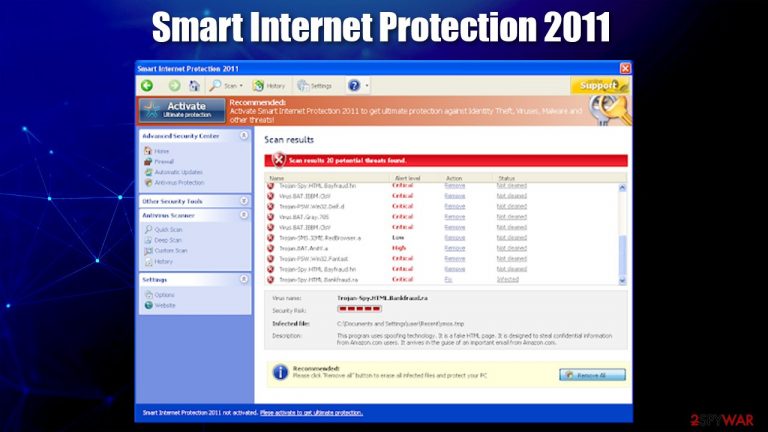
Smart Internet Protection 2011 is a rogue anti-spyware program that should never be trusted for your Windows protection. This rogue program deliberately displays fake alerts and uses scare tactics to make you think your computer is infected with malware. In other words, it is a scam you should never trust.
That's why Smart Internet Protection 2011 is classified as a rogue anti-spyware program. The rogue program is promoted through the use of fake scanners and other malware, stating that your computer has a security risk or that your private information can be stolen. If you found this malicious app on your machine seemingly out of nowhere, you should use this guide to delete all malicious files.
| Name | Smart Internet Protection 2011 |
| Type | Rogue anti-spyware, malware, scareware |
| Distribution | Fake notifications about virus infections on malicious websites |
| Similar | PC Antivirus Pro, Spyware Protect 2009, Vista Guardian |
| Dangers | Personal information disclosure to cybercriminals, financial losses, identity theft, other malware infections |
| Removal | Perform a full system scan with SpyHunter 5Combo Cleaner anti-malware software |
| System fix | To revert malware damage to system files and avoid Windows reinstallation, we recommend using FortectIntego |
Just as many other fake anti-spyware programs, this one uses fake online scanning animations in order to make people believe that they have a virus on their computers. Users get scared and download the promoted application. As soon as they do that, Smart Internet Protection 2011 begins its malicious deeds on a Windows PC.
As evident, the programs tries to imitate a security app that allegedly protects you from all threats online. Unfortunately, not only does not have a working virus database or malware recognition mechanists, but it acts as malware itself.
After the fake scan these rogue scanners display a screen stating that your computer is infected with numerous viruses and that you should download and install the promoted app in order to remove the infections from your computer. If you have this rogue program on your computer please use the removal instructions below to remove it manually for free or with an automatic removal tool upon detection.
Smart Internet Protection 2011 is configured to start automatically when you login to Windows. When running, will scan your computer and display numerous infections that cannot be removed unless you first purchase the program. These infections are all fake and are only being shown to scare you into into purchasing the bogus software.
Besides this, the malware would perform the following on your computer:
- display fake security alerts on your computer containing fake information to further convince you that your computer has some serious security and privacy issues;
- hijack Google Chrome, Internet Explorer, or another used browser to protect itself from being removed using legitimate anti-spyware programs;
- prevent you from using the Task Manager, Registry Editor or other vital Windows functions;
- change the proxy settings of your web browser to redirect you to malicious websites;
- block legitimate security programs, misleadingly claiming that they are viruses.
As you can see, this program is nothing more but a scam. It uses misleading methods to trick users into purchasing useless software. Do not purchase it; otherwise, you will lose your money and give your credit card details to scammers. In order to remove Smart Internet Protection 2011, scan your machine with security software (we recommend SpyHunter 5Combo Cleaner) and then use FortectIntego to fix the damage done to Windows system files.
Learn to recognize deception online to prevent malware infections
While the leading malware distribution technique remains malicious spam emails, fake update prompts and fake online notifications still pose a great risk to users. First of all, you might end up on a malicious website at any time, especially if you are keen on browsing high-risk sites – good examples are torrent sites that distribute pirated programs and cracks.
Potentially unwanted programs such as adware might also engage in browser redirects, so you should check your system for those. In any case, once you land on a website that claims that something is missing (Flash Player) or that your computer is infected with malware, never download anything that is offered, as these claims are fake.
Always visit official websites in order to download the latest updates for all your software. Likewise, use reputable security software to detect and remove malware, as well as protect from its entry with the real-time protection feature.
Smart Internet Protection 2011 removal process explained
Since this rogue changes your LAN settings and prevents legitimate security software from launching correctly, you should access Safe Mode with Networking first:
- Restart your computer. As your computer restarts but before Windows launches, tap “F8” key constantly. Use the arrow keys to highlight the “Safe Mode with Networking” option as shown in the image below, and then press ENTER. If you need more detailed instructions, please check the guide below.
- Open Internet Explorer. Click on the Tools menu and then select Internet Options.
- In the the Internet Options window click on the Connections tab. Then click on the LAN settings button.
- Now you will see Local Area Network (LAN) settings window. Uncheck the checkbox labeled Use a proxy server for your LAN under the Proxy Server section and press OK.
- Download an automatic removal tool from this page and run a full system scan.
Do not forget that you need to revert changes made to your web browsers as well – clean web data and cookies. To do this step quickly and also fix all the Windows system damage that could have been sustained due to the infection, use FortectIntego.
Getting rid of Smart Internet Protection 2011. Follow these steps
Manual removal using Safe Mode
Important! →
Manual removal guide might be too complicated for regular computer users. It requires advanced IT knowledge to be performed correctly (if vital system files are removed or damaged, it might result in full Windows compromise), and it also might take hours to complete. Therefore, we highly advise using the automatic method provided above instead.
Step 1. Access Safe Mode with Networking
Manual malware removal should be best performed in the Safe Mode environment.
Windows 7 / Vista / XP
- Click Start > Shutdown > Restart > OK.
- When your computer becomes active, start pressing F8 button (if that does not work, try F2, F12, Del, etc. – it all depends on your motherboard model) multiple times until you see the Advanced Boot Options window.
- Select Safe Mode with Networking from the list.
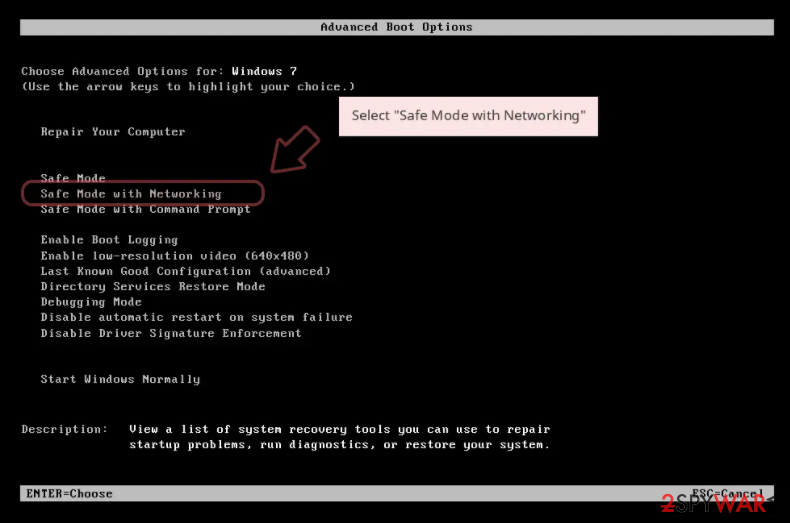
Windows 10 / Windows 8
- Right-click on Start button and select Settings.
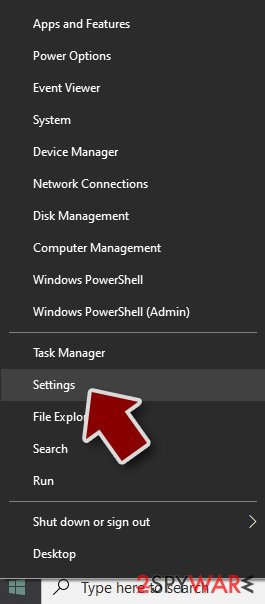
- Scroll down to pick Update & Security.
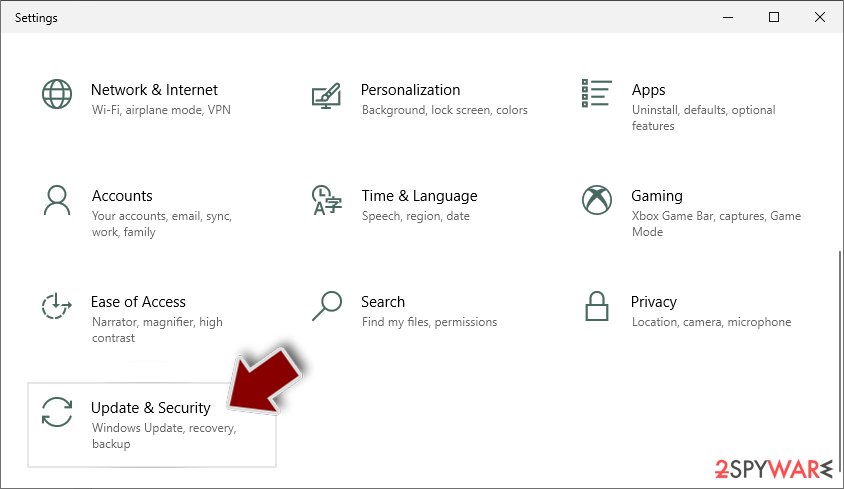
- On the left side of the window, pick Recovery.
- Now scroll down to find Advanced Startup section.
- Click Restart now.
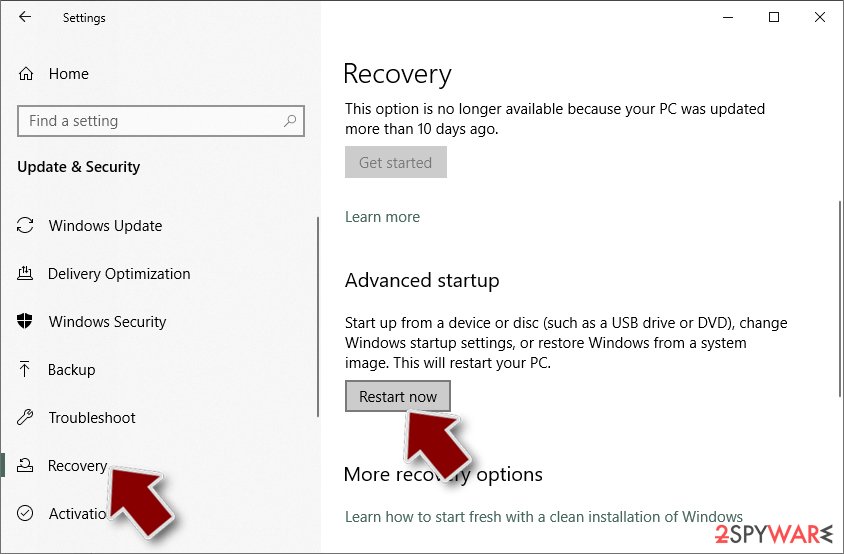
- Select Troubleshoot.
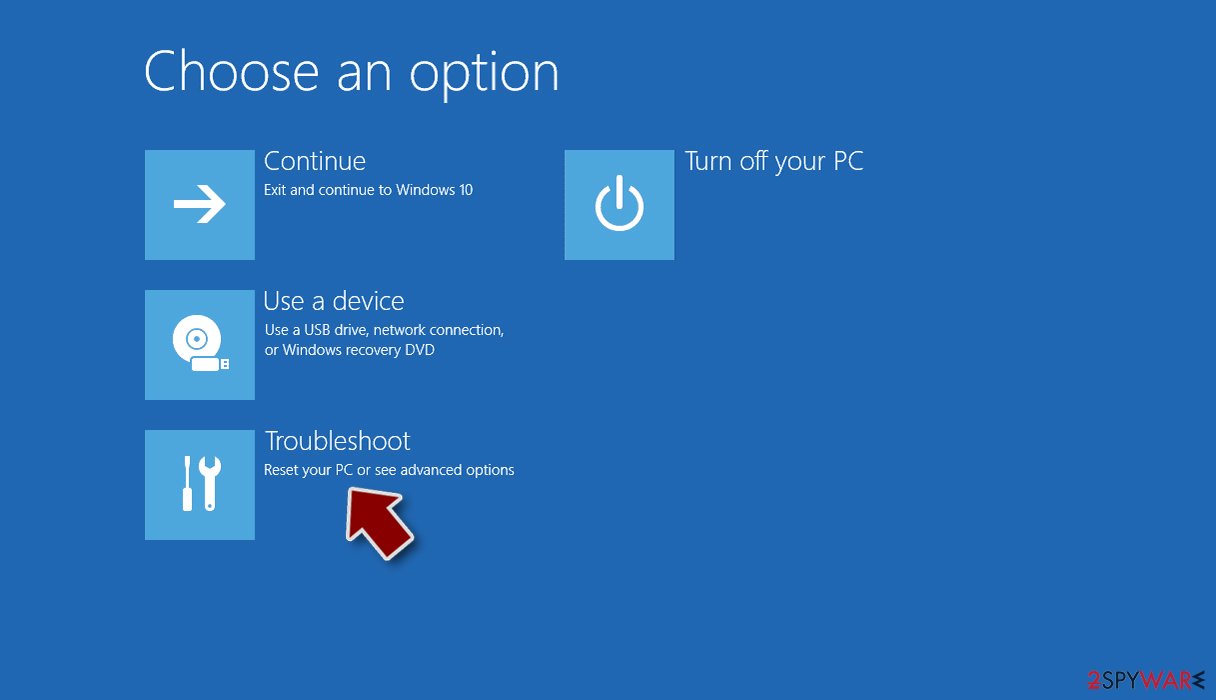
- Go to Advanced options.
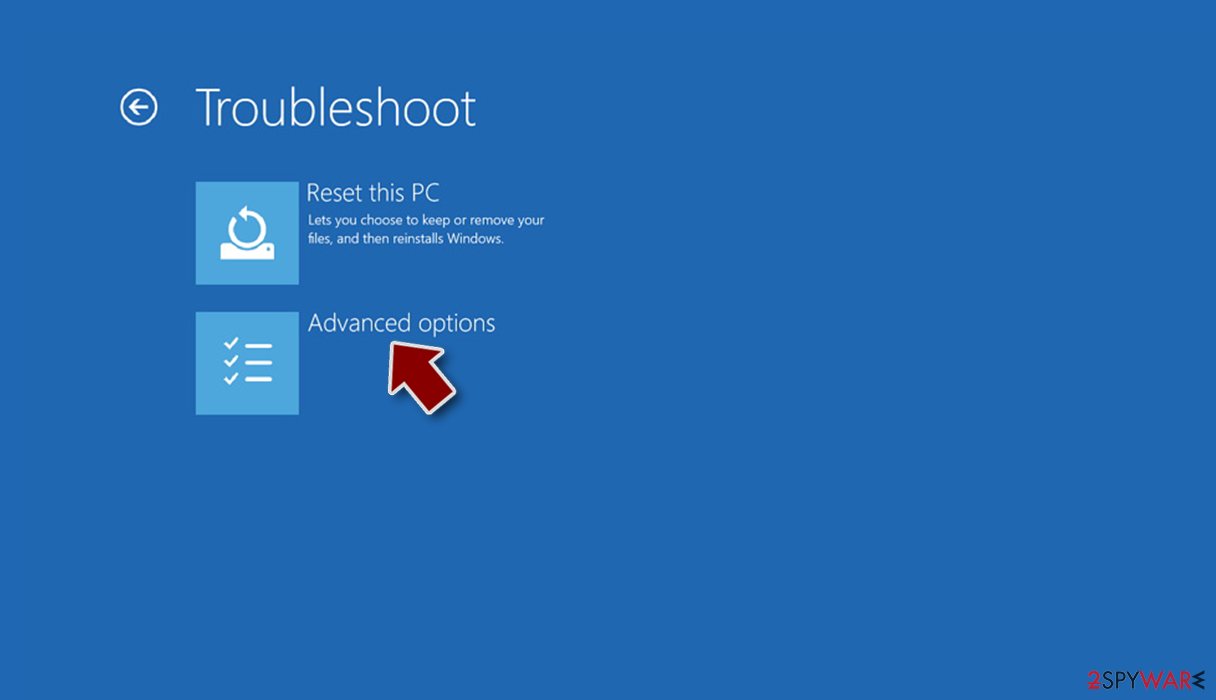
- Select Startup Settings.
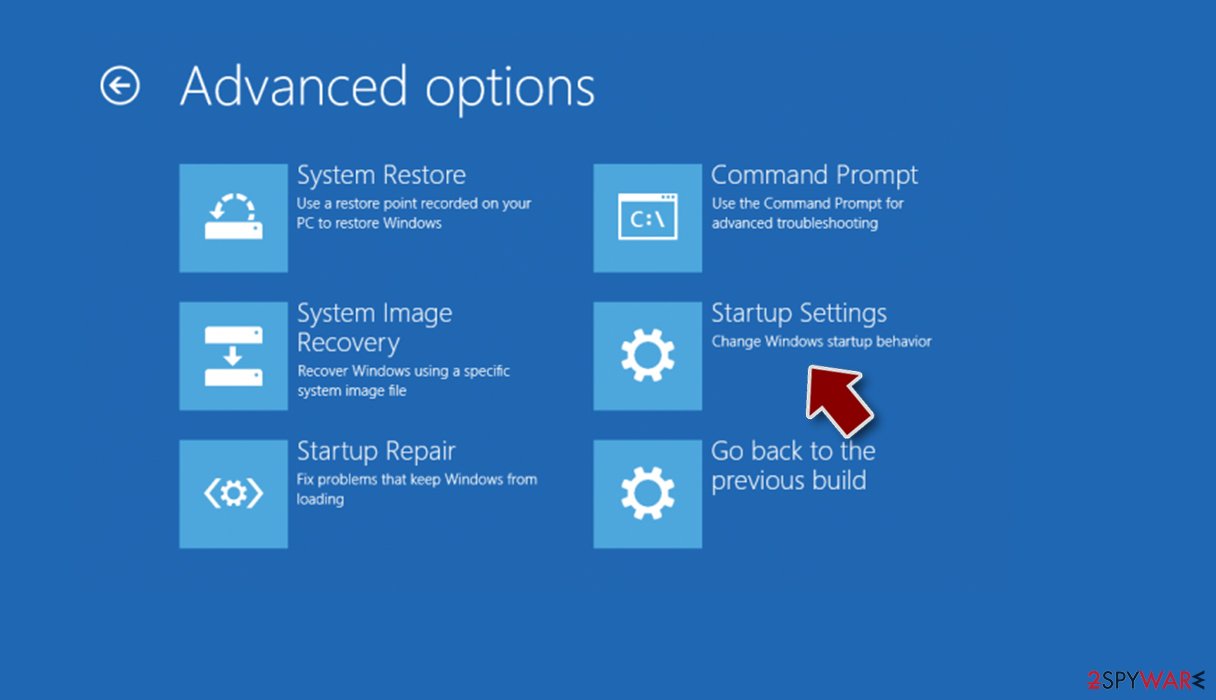
- Press Restart.
- Now press 5 or click 5) Enable Safe Mode with Networking.
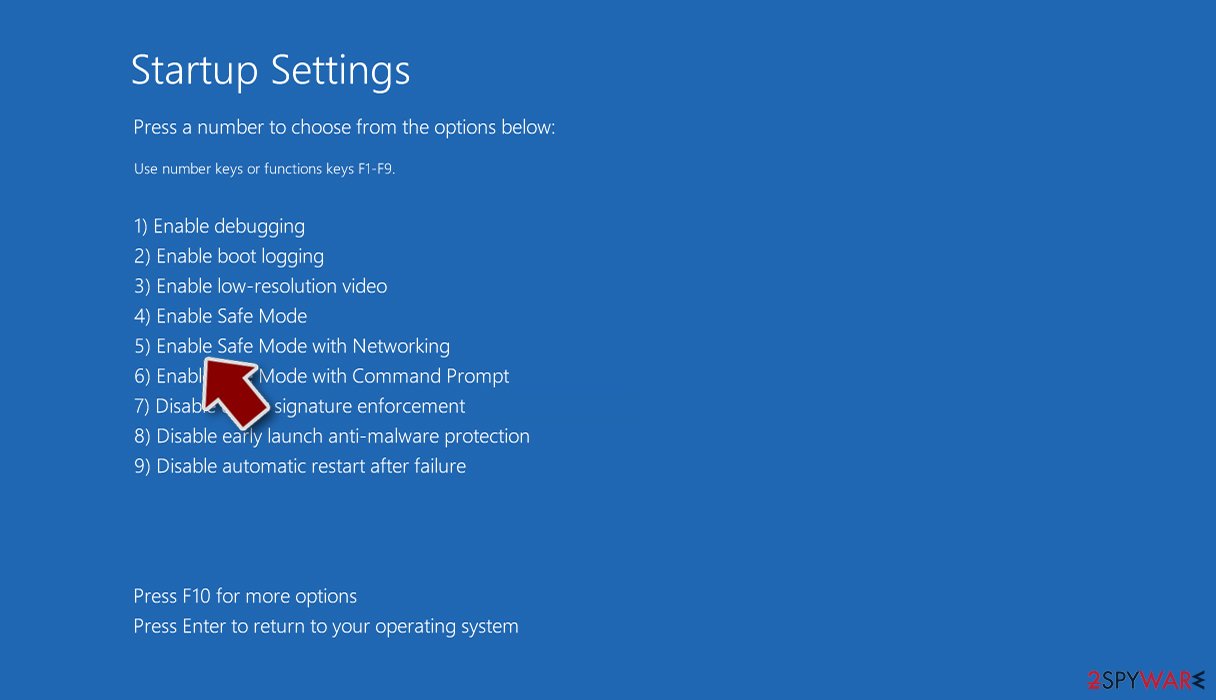
Step 2. Shut down suspicious processes
Windows Task Manager is a useful tool that shows all the processes running in the background. If malware is running a process, you need to shut it down:
- Press Ctrl + Shift + Esc on your keyboard to open Windows Task Manager.
- Click on More details.
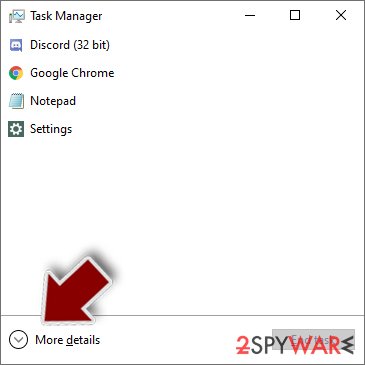
- Scroll down to Background processes section, and look for anything suspicious.
- Right-click and select Open file location.
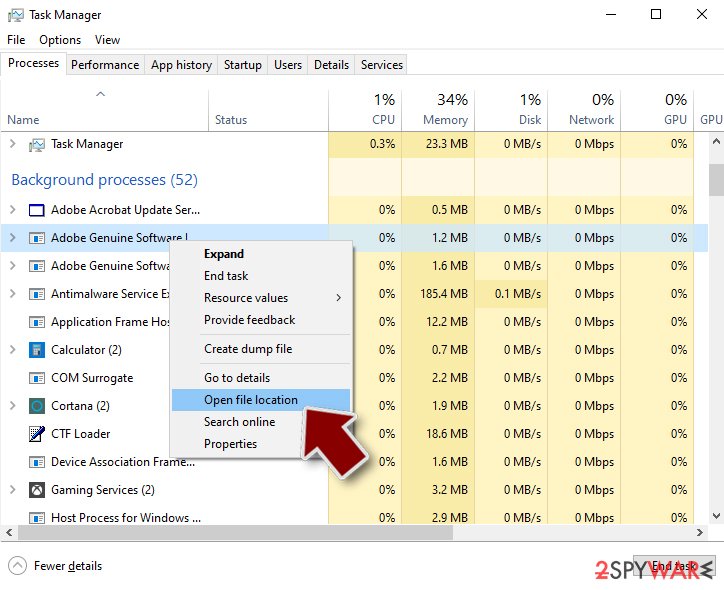
- Go back to the process, right-click and pick End Task.
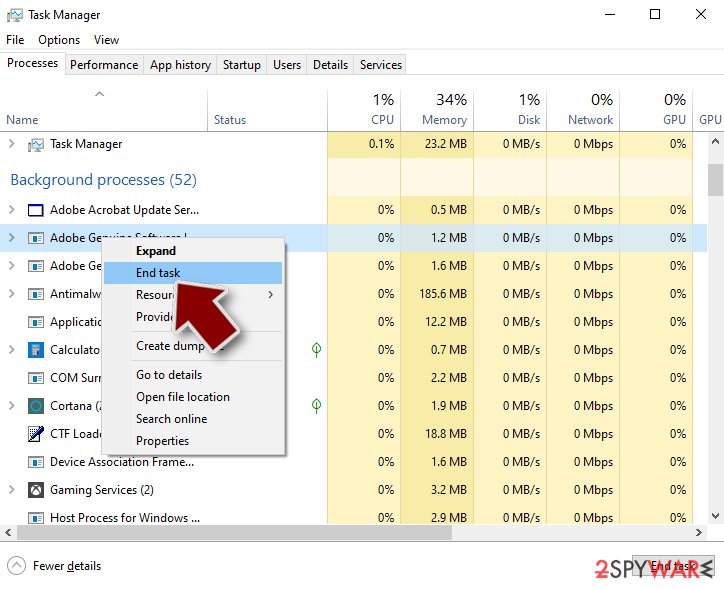
- Delete the contents of the malicious folder.
Step 3. Check program Startup
- Press Ctrl + Shift + Esc on your keyboard to open Windows Task Manager.
- Go to Startup tab.
- Right-click on the suspicious program and pick Disable.
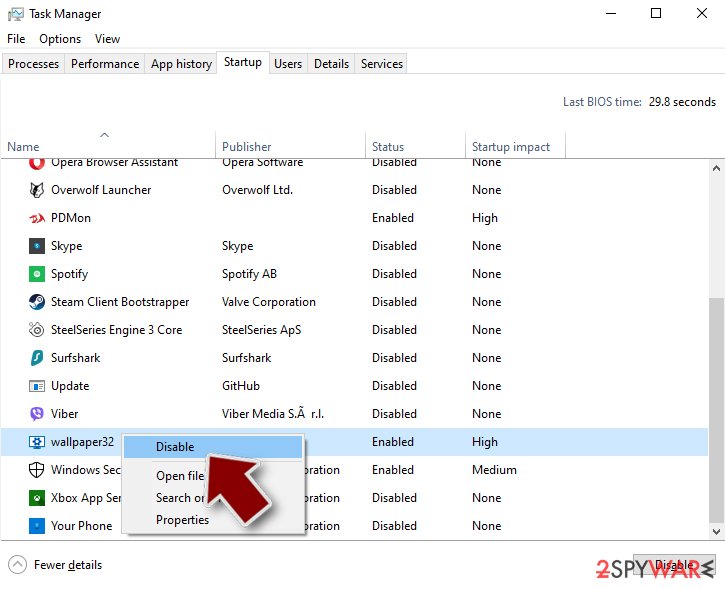
Step 4. Delete virus files
Malware-related files can be found in various places within your computer. Here are instructions that could help you find them:
- Type in Disk Cleanup in Windows search and press Enter.
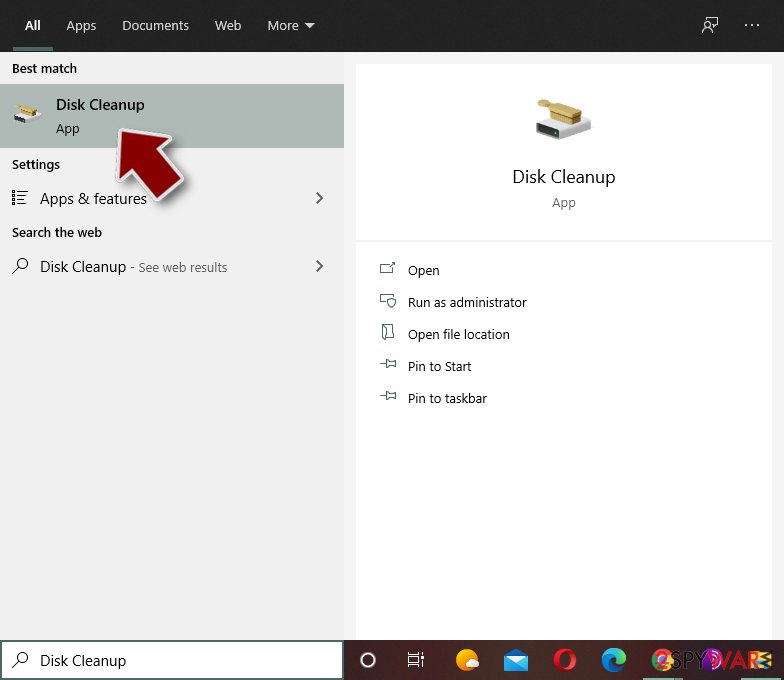
- Select the drive you want to clean (C: is your main drive by default and is likely to be the one that has malicious files in).
- Scroll through the Files to delete list and select the following:
Temporary Internet Files
Downloads
Recycle Bin
Temporary files - Pick Clean up system files.
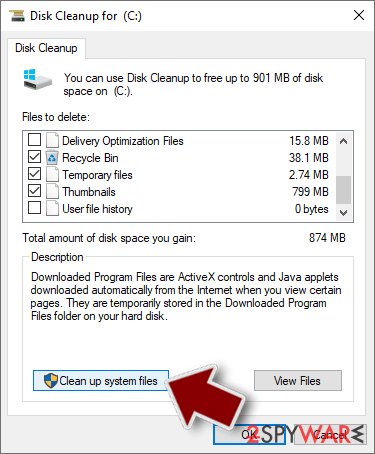
- You can also look for other malicious files hidden in the following folders (type these entries in Windows Search and press Enter):
%AppData%
%LocalAppData%
%ProgramData%
%WinDir%
After you are finished, reboot the PC in normal mode.
Finally, you should always think about the protection of crypto-ransomwares. In order to protect your computer from Smart Internet Protection 2011 and other ransomwares, use a reputable anti-spyware, such as FortectIntego, SpyHunter 5Combo Cleaner or Malwarebytes
How to prevent from getting rogue antispyware
Access your website securely from any location
When you work on the domain, site, blog, or different project that requires constant management, content creation, or coding, you may need to connect to the server and content management service more often. The best solution for creating a tighter network could be a dedicated/fixed IP address.
If you make your IP address static and set to your device, you can connect to the CMS from any location and do not create any additional issues for the server or network manager that needs to monitor connections and activities. VPN software providers like Private Internet Access can help you with such settings and offer the option to control the online reputation and manage projects easily from any part of the world.
Recover files after data-affecting malware attacks
While much of the data can be accidentally deleted due to various reasons, malware is one of the main culprits that can cause loss of pictures, documents, videos, and other important files. More serious malware infections lead to significant data loss when your documents, system files, and images get encrypted. In particular, ransomware is is a type of malware that focuses on such functions, so your files become useless without an ability to access them.
Even though there is little to no possibility to recover after file-locking threats, some applications have features for data recovery in the system. In some cases, Data Recovery Pro can also help to recover at least some portion of your data after data-locking virus infection or general cyber infection.
